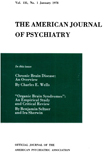USES AND ABUSES OF ANTIPARKINSONIAN MEDICATION
Abstract
The antiparkinsonian medication of 30 mental hospital patients was suddenly removed. Half the patients were then placed on placebo. During the ensuing month they did not manifest any significant change in extrapyramidal symptomatology. The other half of the patients received no replacement and during the ensuing month their extrapyramidal symptoms became significantly worse (p≤.02) than during the pretrial period. In other words, it was not the withdrawal of the actual antiparkinsonian compound, but the withdrawal of the factor of non-specific psychological treatment which brought about an increase of parkinsonian manifestations. It should be added that one-third of those who received no replacement whatsoever showed no increase of parkinsonian manifestations.
These results would imply that potentially toxic antiparkinsonian medication was unnecessary in the vast majority of patients, although two-thirds would require some sort of non-specific psychological treatment to keep their symptoms in check.
Access content
To read the fulltext, please use one of the options below to sign in or purchase access.- Personal login
- Institutional Login
- Sign in via OpenAthens
- Register for access
-
Please login/register if you wish to pair your device and check access availability.
Not a subscriber?
PsychiatryOnline subscription options offer access to the DSM-5 library, books, journals, CME, and patient resources. This all-in-one virtual library provides psychiatrists and mental health professionals with key resources for diagnosis, treatment, research, and professional development.
Need more help? PsychiatryOnline Customer Service may be reached by emailing [email protected] or by calling 800-368-5777 (in the U.S.) or 703-907-7322 (outside the U.S.).



